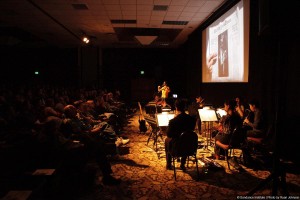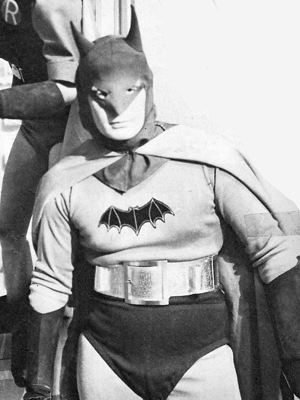By Sheri Candler
Originally published on www.thefilmcollaborative.org
 There is a lot of talk in independent film circles about the need to “eventize” the cinematic experience. The thought is that audiences are increasingly satisfied with viewing films and other video material on their private devices whenever their schedule permits and the need to leave the house to go to a separate place to watch is becoming an outdated notion, especially for younger audiences. But making your work an event that can only be experienced in a live setting is something few creators are exploring at the moment. Sure, some filmmakers and distributors are adding live Q&As with the director or cast, sometimes in person and sometimes via Skype; discussion panels with local organizations are often included with documentary screenings; and sometimes live musical performances are included featuring the musicians on the film’s soundtrack, but what about work that can ONLY be enjoyed as a live experience? Work that will never appear on DVD or digital outlets? Not only is there an artistic reason for creating such work, but there can be a business reason as well.
There is a lot of talk in independent film circles about the need to “eventize” the cinematic experience. The thought is that audiences are increasingly satisfied with viewing films and other video material on their private devices whenever their schedule permits and the need to leave the house to go to a separate place to watch is becoming an outdated notion, especially for younger audiences. But making your work an event that can only be experienced in a live setting is something few creators are exploring at the moment. Sure, some filmmakers and distributors are adding live Q&As with the director or cast, sometimes in person and sometimes via Skype; discussion panels with local organizations are often included with documentary screenings; and sometimes live musical performances are included featuring the musicians on the film’s soundtrack, but what about work that can ONLY be enjoyed as a live experience? Work that will never appear on DVD or digital outlets? Not only is there an artistic reason for creating such work, but there can be a business reason as well.
In reading a New York Times piece entitled “The one filmmaker who doesn’t want a distribution deal” about the Sundance premiere of Sam Green’s live documentary The Measure of All Things, I was curious to find out why a filmmaker would say he never plans for this work to show on streaming outlets like Netflix, only as a live event piece. I contacted Sam Green and he was kind enough to share his thoughts about why he likes creating for and participating with the audience of his work and why the economics of this form could be much more lucrative for documentary filmmakers.


 It would seem, to the eyes of Hollywood, the high form of film has become the franchise. It satisfies the two poles of conventional business wisdom: limiting risk as it promises more of the same, maximizing profit as it entices investors with that self-same prospect.[1] The Hobbit is stretched out to encompass three movies, hordes of young adult novels are on the horizon, and Bob Iger suggests Frozen
It would seem, to the eyes of Hollywood, the high form of film has become the franchise. It satisfies the two poles of conventional business wisdom: limiting risk as it promises more of the same, maximizing profit as it entices investors with that self-same prospect.[1] The Hobbit is stretched out to encompass three movies, hordes of young adult novels are on the horizon, and Bob Iger suggests Frozen 